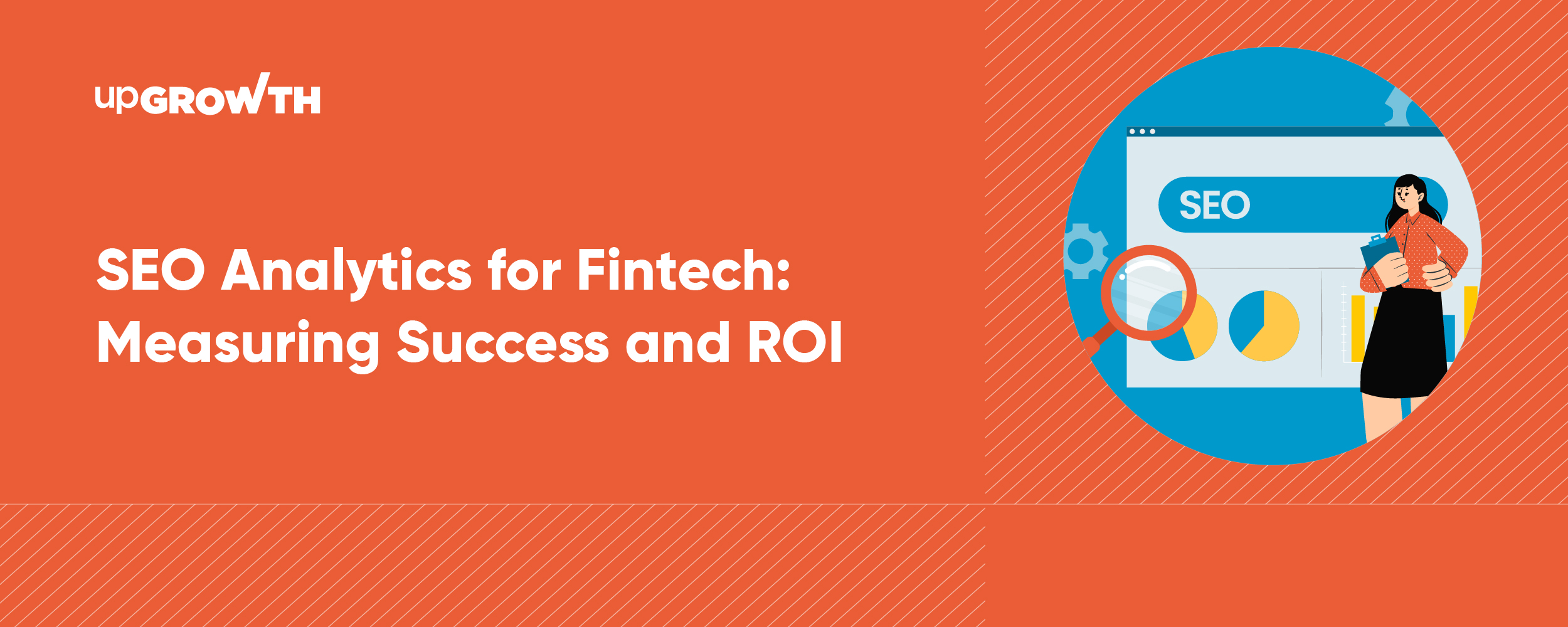SEO Analytics for Fintech: Measuring Success and ROI
Contributors:
Rohit Khot
Published: January 3, 2024

Introduction
In the fintech sector, SEO analytics is an indispensable tool for measuring the efficacy of digital marketing strategies. As fintech companies navigate the complex digital landscape, understanding and leveraging SEO analytics becomes crucial for evaluating success and optimizing return on investment (ROI).
This comprehensive approach to SEO analytics enables fintech firms to fine-tune their strategies, ensuring they resonate with their target audience and meet business objectives.
Fundamentals of SEO Analytics
SEO analytics lays the foundation for understanding how fintech websites perform in search engines. It involves analyzing various metrics that reflect the website’s visibility, user engagement, and conversion rates.
- Defining Key SEO Metrics for Fintech: Key SEO metrics include organic traffic, keyword rankings, backlink quality, page load speed, and user engagement metrics like bounce rate and session duration. In fintech, where trust and credibility are paramount, these metrics help assess how effectively a website attracts and retains its target audience, providing insights into the user journey from initial discovery to conversion.
- Overview of Common Analytical Tools: Tools like Google Analytics offer insights into website traffic and user behavior, while SEMrush or Ahrefs provide comprehensive data on keyword rankings and backlink profiles. Leveraging these tools allows fintech companies to track their SEO performance and make informed decisions.
- Aligning SEO Metrics with Business Objectives: It’s essential to align SEO metrics with fintech business objectives like lead generation, customer acquisition, or brand awareness. This alignment ensures that SEO efforts contribute to tangible business goals, providing a clear picture of the ROI from SEO activities.
Tracking and Analyzing Organic Traffic
Understanding and analyzing organic traffic is crucial for fintech companies to gauge the effectiveness of their SEO strategies.
- Tracking Organic Traffic and Its Relevance: Tracking organic traffic involves monitoring the number of visitors who arrive at a website through unpaid search results. This metric is particularly relevant for fintech companies as it indicates the website’s ability to attract users interested in financial services.
- Understanding Traffic Sources and User Behavior: Analyzing where traffic originates from and how users behave on the site helps fintech companies understand which SEO strategies work and what aspects of the website resonate with their audience.
- Analyzing Page Views, Unique Visitors, and Bounce Rates: These metrics provide insights into the website’s reach and user engagement. High page views and unique visitors suggest effective reach, while a low bounce rate indicates the site’s content is relevant to the audience’s needs.
Keyword Performance Analysis
Keywords are the cornerstone of SEO, and their performance directly impacts fintech companies’ online visibility.
- Tracking Keyword Rankings and Performance: This involves monitoring how well a website ranks for specific keywords related to FinTech services. Understanding keyword performance helps fintech firms identify opportunities to improve their SEO strategies and attract more qualified traffic.
- Impact of Keywords on Lead Generation in Fintech: In the fintech industry, where specific financial services or products are offered, the right keywords can significantly influence lead generation. High-ranking keywords aligning with user intent can drive traffic likely to convert customers.
- Identifying High-Converting Keywords: Focusing on keywords that drive conversions is crucial. Analyzing which keywords lead to sign-ups, downloads, or sales can help fintech companies refine their content and SEO strategies for maximum impact.
User Experience (UX) and SEO
User experience is a critical SEO component, influencing search rankings and user satisfaction.
- Measuring User Engagement Metrics: Metrics like time on site and pages per session give insights into how users interact with a FinTech website. High engagement indicates that the site’s content is valuable and relevant to users, which can positively impact SEO rankings.
- The Role of UX in SEO and Conversion Rates: A positive user experience leads to higher engagement and conversion rates. For fintech companies, ensuring a seamless, intuitive user journey on their website is critical to retaining and encouraging users to take desired actions.
- Tools and Techniques for UX Analysis: Tools like Google’s PageSpeed Insights assess website performance, while user behavior analysis tools like Hotjar provide insights into how users interact with a site. These tools help fintech companies optimize their websites for better user experience and SEO performance.
Competitive Analysis in SEO
In the competitive fintech industry, understanding how your SEO efforts compare to others is crucial.
- Conducting an SEO Competitive Analysis: This involves evaluating competitors’ SEO strategies to identify their strengths and weaknesses. Tools like SEMrush can help fintech companies analyze competitors’ keyword strategies, backlink profiles, and content quality.
- Tools and Metrics for Benchmarking Against Competitors: Benchmarking involves comparing your SEO metrics, like keyword rankings, domain authority, and organic traffic, to those of your competitors. This comparison can provide valuable insights into areas where your fintech company can improve its SEO strategy.
- Learning from Competitors’ SEO Strategies: Analyzing competitors’ successes and failures in SEO can offer valuable lessons. Understanding what content, keywords, or technical strategies are working for competitors can help fintech companies refine their approach to gain a competitive edge.
The Future of SEO Analytics in Fintech
The landscape of SEO analytics is continually evolving, and fintech companies must stay ahead of the curve to remain competitive.
- Emerging Trends and Tools in SEO Analytics: Staying abreast of trends like AI-driven analytics and voice search optimization is crucial for fintech companies. New tools and technologies can provide deeper insights and more effective optimization strategies.
- Preparing for Changes in Search Engine Algorithms and User Behavior: The SEO landscape is subject to frequent changes in search engine algorithms and shifts in user behavior. Fintech companies must be agile and ready to adapt their SEO strategies in response to these changes.
- Continuously Evolving Your Analytics Strategy: The key to long-term SEO success is continuous adaptation and refinement. Regularly updating and evolving your SEO analytics strategy ensures that your fintech company’s online presence stays aligned with current trends and best practices.
Conclusion
In conclusion, SEO analytics is vital to a fintech company’s digital marketing strategy. Fintech firms can optimize their online presence and achieve sustainable growth in the competitive financial technology market by effectively leveraging key metrics, tracking user behavior, and staying updated with the latest trends.
FAQs
1. What are the key performance indicators (KPIs) that fintech marketers track to assess SEO performance?
Fintech marketers should track KPIs such as organic traffic, keyword rankings, click-through rates (CTR), conversion, and bounce rates. Additionally, backlink quality, domain authority, and page load speed are essential for assessing SEO health. These KPIs provide insights into how well a fintech website performs in search engines, how effectively it attracts and retains users, and its overall search visibility and engagement.
2. How do you calculate the return on investment (ROI) of SEO campaigns in the fintech sector?
To calculate the ROI of SEO campaigns in FinTech, determine the total cost of SEO efforts, including tools, resources, and workforce. Then, measure the revenue generated from these efforts, such as increased sales or lead conversions directly attributable to SEO. ROI is calculated by subtracting the initial investment from the gained revenue and dividing it by the investment, often expressed as a percentage.
3. Are there specialized analytics tools tailored to measure SEO impact for fintech businesses?
While there are no analytics tools exclusively for fintech, many general SEO tools like SEMrush, Ahrefs, and Moz offer features beneficial for fintech companies. These include keyword research, competitor analysis, and backlink tracking. Google Analytics and Google Search Console are also critical for tracking website traffic and performance, providing valuable data that fintech companies can use to tailor their SEO strategies.
4. What role does Google Analytics play in monitoring and analyzing SEO results for fintech websites?
Google Analytics is crucial in tracking and analyzing SEO results for fintech websites. It provides comprehensive data on website traffic, user behavior, source of traffic, and conversion metrics. This information helps fintech companies understand how users interact with their site, which SEO strategies drive traffic, and which areas need improvement in attracting and engaging their target audience.
5. Can you provide examples of actionable insights that fintech companies have gained from SEO analytics data?
From SEO analytics data, fintech companies can gain actionable insights such as identifying the most effective keywords driving traffic and conversions, understanding which content performs best, and pinpointing user experience issues on their site. For example, a fintech company might discover that specific blog posts about investment strategies significantly drive user engagement, leading to an increased focus on similar content. Or, analytics might reveal that pages with high bounce rates need optimization for better user engagement.
Read More:
Power of SEO in Fintech App Development: A Guide to Boosting Visibility
Voice Search SEO for Fintech: Adapting to Changing Search Trends
International SEO for Fintech: Expanding Globally with SEO
Fintech SEO Trends to Watch in 2024 – How Fintech Startups Can Leverage SEO for Growth
How Much Should Fintechs Spend on Marketing: Budget Allocation
Fintech Marketing 2024: Tackle Marketing Challenges with 12 Unique Strategies
About the Author
SEO Manager
The SEO wizard, Rohit is keen on sharing his experiences and expertise with his readers. An ardent SEO follower, his blogs are up-to-date with the latest gossip & news of the SEO world.
 Growth Strategy and Planning
Growth Strategy and Planning Inbound Growth
Inbound Growth Growth Hacking
Growth Hacking Search Engine Optimization
Search Engine Optimization Paid and Performance Marketing
Paid and Performance Marketing Social Media Marketing
Social Media Marketing AI-Driven Growth Strategy
AI-Driven Growth Strategy
 Growth Tools
Growth Tools Offers
Offers


















Leave a Reply